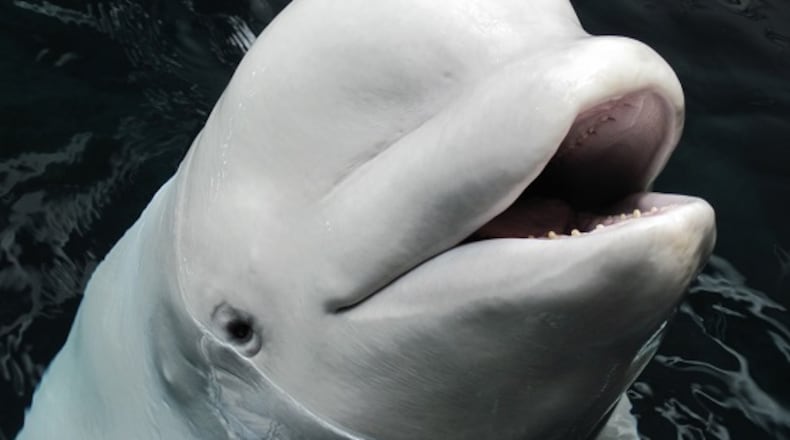What killed Maris?
The Georgia Aquarium’s 21-year-old beluga whale died suddenly Thursday of no known cause, after losing two of her infants.
Pathologists at the University of Georgia are performing a necropsy on the snow white whale.
And while the results of that animal autopsy won’t be known for several weeks, one outcome will be known right away: The death is another round of bad news for an Atlanta institution that’s already having a bad year.
There was great celebration when Maris gave birth to a seemingly healthy calf in May of this year, but the newborn failed to gain weight and died a month later.
It was the second loss for the young mother, who gave birth in 2012 to a calf that was unable to swim. That calf died days later. Necropsy results from that death are still unknown. Now the mother herself has died.
The aquarium has suffered legal losses as well. In a bid to improve the genetic diversity of the captive belugas in the U.S., the Georgia Aquarium applied several years ago to import 18 wild-caught belugas into this country. That application was denied by the National Oceanic and Atmospheric Administration and the aquarium’s lawsuit to reverse that decision was rejected last month in U.S. District Court.
The legal loss is a setback for successful breeding of belugas, who have a lifespan of 35 to 50 years. But the death of Maris is personally painful for the many aquarium staff and volunteers involved in her care, some of whom participated in round-the-clock vigils during her pregnancies.
Tim Binder, vice president of animal care at the Shedd Aquarium in Chicago, was director of husbandry at the Georgia Aquarium from 2004-2008, and helped bring Maris to Atlanta in 2005. “My heart goes out to those caring for the animal, because I know what these losses are like,” said Binder.
Those opposed to keeping belugas and other marine mammals in human care were quick to blame Maris’ death on the challenges of a captive life. “There is something about captivity that is not compatible with life for these animals,” said Lori Marino, a former researcher at Emory University and founder of the Kimmela Center for Animal Advocacy. “It is a precarious practice, to say the least.”
A spokesperson for the activist group People for the Ethical Treatment of Animals, was more blunt: “Everything that was important to Maris was taken away from her,” said PETA senior vice president Lisa Lange, in a statement. “Whether or not she had a physical ailment that went unnoticed, she was killed by captivity, plain and simple.”
Spokespeople for the Georgia Aquarium declined to comment on Friday, beyond the statement that was posted on the aquarium’s website. That statement said Maris seemed healthy at her most recent routine exam. “She had been eating normally and engaging in enrichment and interaction with our two other beluga whales, Grayson and Qinu,” said the statement.
“This is a case of sudden, acute animal death,” said Dr. Gregory Bossart, senior vice president and chief veterinary officer of Georgia Aquarium in the statement. “Our animals receive exceptional care, and our dedicated team of experts responded to her within minutes to render aid.”
Friday morning was sunny, and the plaza outside the Georgia Aquarium was alive with the chattering voices of excited schoolchildren, pouring out of buses to enjoy a field trip to the downtown attraction.
Watching over her brood of seventh graders was Teresa Huckaby, a Polk County schoolteacher who lives in Cave Spring. Her school had already planned the aquarium trip when she found out about the death of Maris.
“I just shook my head,” said Huckaby, who is not in favor of wild animals being kept in zoos or aquariums. “I thought ‘she shouldn’t have been there anyway.’”
James and Melissa Drury, visiting from New Hampshire with their children Isaac and Rachel, disagreed with that sentiment. The Drurys are both Georgia Tech graduates, back in town for the school’s homecoming celebrations this weekend.
They suggested that the benefits of captivity outweigh the drawbacks.
“I don’t question ‘should they have belugas in captivity?’” said James Drury, a telecom professional. “Yes, they should.”
Said Melissa Drury, a graduate in aerospace engineering, “It offers a chance for the public to be more aware of those animals who are endangered.”
She added that she was glad for a chance to give her home-schooled children a little marine biology in their holiday weekend.
With that, the Drurys joined those queued up to see whale sharks, manta rays and beluga whales at the Georgia Aquarium, a landmark facility that has now lost one of its matriarchs.
About the Author
Keep Reading
The Latest
Featured



